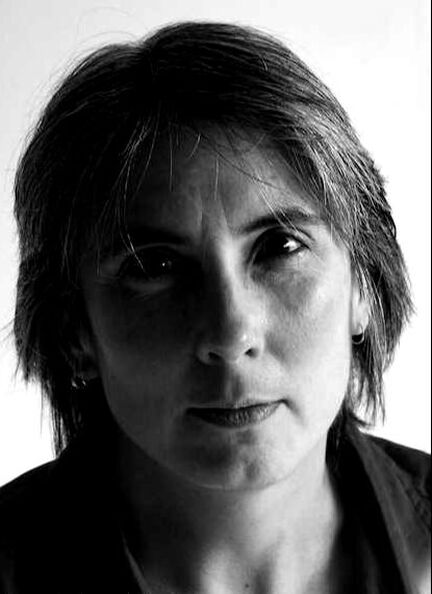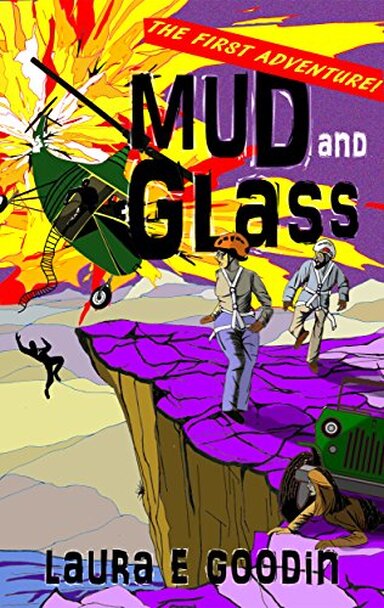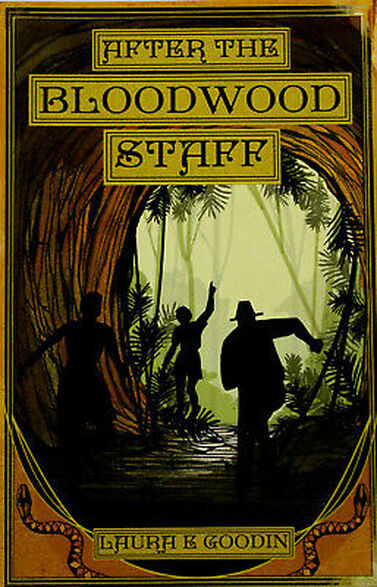
It gives me great pleasure to welcome Laura E. Goodin onto the site today. Laura has been writing professionally for over 30 years. Her stories have appeared in publications too numerous to mention. Her plays and libretti have been performed on three continents. And her poetry has been performed internationally.
Alex: Tell us a bit about yourself, Laura.
Laura: I was born and raised in New Jersey, although for most of that time, I lived in an improbably rural part of the state; real backwoods stuff. Kids in the country spend a fair bit of time on their own until they get their driver’s licenses, and I learned to love solitude, woods, and mountains. I’m still happiest amongst mountains. It became obvious early on that I was drawn to writing; I started writing stories when I was about six or seven, and spent my school years entering spelling bees and essay contests, and writing, writing, writing – stories, poems, plays, anything, everything. By the time I was 17, I was pretty sure I wanted to be a reporter, and reporters need to know a lot of history and political science, so off I went to university to study them. However, after a couple of summers actually working as a reporter, I realized it wasn’t for me (or I wasn’t for it). I began working at a series of jobs that all ended up involving writing, editing, or both – but always for someone else. After a few decades of this, I decided the time had come to take my own writing more seriously. One of the first things I did during this period of change was attend the six-week Clarion South workshop, which was exhilarating, gruelling, and transformative. I haven’t looked back.
Alex: Tell us a bit about yourself, Laura.
Laura: I was born and raised in New Jersey, although for most of that time, I lived in an improbably rural part of the state; real backwoods stuff. Kids in the country spend a fair bit of time on their own until they get their driver’s licenses, and I learned to love solitude, woods, and mountains. I’m still happiest amongst mountains. It became obvious early on that I was drawn to writing; I started writing stories when I was about six or seven, and spent my school years entering spelling bees and essay contests, and writing, writing, writing – stories, poems, plays, anything, everything. By the time I was 17, I was pretty sure I wanted to be a reporter, and reporters need to know a lot of history and political science, so off I went to university to study them. However, after a couple of summers actually working as a reporter, I realized it wasn’t for me (or I wasn’t for it). I began working at a series of jobs that all ended up involving writing, editing, or both – but always for someone else. After a few decades of this, I decided the time had come to take my own writing more seriously. One of the first things I did during this period of change was attend the six-week Clarion South workshop, which was exhilarating, gruelling, and transformative. I haven’t looked back.

Alex: How would you describe your writing, and are there particular themes that you like to explore?
Laura: My writing is all over the map, both in terms of form (novels, short stories, flash fiction, poetry, scripts) and tone (although I prefer writing humorous stories in which things mostly turn out okay in the end). I also seem to keep returning again and again to the themes that have begun to be gathered under the heading of hopepunk: the fight against evil matters; we’re all in this together; and even if things don’t turn out all right this time, we need to keep fighting.
Alex: Are you a writer that plans a detailed synopsis or do you set out with a vague idea and let the story unfold as you write?
Laura: It varies according to the project. At the moment, I’m involved in a collaborative writing collective where a lot of each story has to conform to the specific world-building set up for the project as a whole, and where the particular people I’m collaborating with have to work with me to set up the story I’m going to draft with their input. That, obviously, requires a lot of up-front planning. However, sometimes (such as for NaNoWriMo), I just let ‘er rip and see what happens. Most of the time I’m somewhere in between: I have somewhat of an idea of where I want to go, but it will often veer into somewhere unexpected as I write.
Laura: My writing is all over the map, both in terms of form (novels, short stories, flash fiction, poetry, scripts) and tone (although I prefer writing humorous stories in which things mostly turn out okay in the end). I also seem to keep returning again and again to the themes that have begun to be gathered under the heading of hopepunk: the fight against evil matters; we’re all in this together; and even if things don’t turn out all right this time, we need to keep fighting.
Alex: Are you a writer that plans a detailed synopsis or do you set out with a vague idea and let the story unfold as you write?
Laura: It varies according to the project. At the moment, I’m involved in a collaborative writing collective where a lot of each story has to conform to the specific world-building set up for the project as a whole, and where the particular people I’m collaborating with have to work with me to set up the story I’m going to draft with their input. That, obviously, requires a lot of up-front planning. However, sometimes (such as for NaNoWriMo), I just let ‘er rip and see what happens. Most of the time I’m somewhere in between: I have somewhat of an idea of where I want to go, but it will often veer into somewhere unexpected as I write.

Alex: Tell us about your latest novel.
Laura: I’m currently working on the second book in my Purple Bay University series, which is a series of fantasy-adventure-humor-satire novels set on a fictional university campus in a world not quite like this one. The first one has gotten some really gratifying reviews, and I’m eager to get the next one out into the world.
Alex: What was the first book you read?
Laura: It had something to do with a caboose that managed to slam on the brakes and save the rest of the train from rolling back downhill into a scene of potential chaos and carnage. Whew! What a relief! Good work, little red caboose! Order has been restored in the universe!
Alex: How much research do you do and what does it usually entail?
Laura: One of the reasons I invented a secondary world for Purple Bay University is that it lets me off the hook for a lot of research – I can just make stuff up, because it’s my world. As the PBU books are satire, that also leaves me quite a bit of room for the kind of exaggeration that constitutes humorous social commentary on our own world. That said, I have a PhD in creative writing and am no stranger to JSTOR. I enjoy building my own expertise in the backgrounds of what I’m writing; for example, I’m taking my time to slowly prepare myself to write a book set in the Regency of George IV – that’s such an absolutely huge area to get my head around that I’m not rushing it. I’m starting with popular history, and will eventually begin inhaling scholarly articles relevant to the themes and settings I want to use. I guess those are the two extremes, and for a lot of projects, I’m somewhere in the middle.
Alex: Do you ever base your characters on people you have encountered in real life?
Laura: Absolutely not. Where would be the fun in that? Plus, it would make me uneasy to do something like that without the consent of the person involved. I may take particular aspects or conversations and use them as I build a character, but to try to directly mimic a real person? No.
Alex: Which was the last book you read that blew you away?
Laura: I just finished Russell Kirkpatrick’s Silent Sorrow (available at https://ifwgaustralia.com/title-silent-sorrow/), a jarringly intense but exceptionally well-thought-out and well-written epic fantasy. It’s volume 1, so there’s more to come...
Alex: How do you market your books?
Laura: My publisher, Odyssey Books (www.odysseybooks.com.au) promotes my books, but of course that’s only part of the whole effort. I publish a newsletter (the link to subscribe is http://eepurl.com/csJ741), I’m active on Facebook and (a bit less so) on Twitter, I teach writing workshops (which is both fun and a good opportunity to bring my work to the attention of potential new readers), I occasionally have a stall at writers’ festivals and markets, and I participate in science-fiction and fantasy conventions and festivals, including being on panels, giving readings and workshops, and presenting academic papers. Posts like this are also useful – thank you for the opportunity!
Alex: What are your interests aside from writing? And what do you do to unwind?
Laura: I’m pretty much obsessed with all the Xena, Warrior Princess sports: martial arts, fencing, horseback riding, climbing, hiking – anything that lets me feel like I’m a character in a fantasy novel. I’m also a fanatically keen bellringer (the big bells in church towers) and an avid cook and quilter. I don’t unwind very often, because I hate to squander a single moment, but when I do, it’s with reading, tea, and (if I don’t have too much tea at a time) naps. Ah, naps...
Alex: Which authors do you particularly admire and why?
Laura: That would be a very long list indeed! The usual suspects, really. Diana Wynne Jones is right up there; Susan Cooper; C.S. Lewis (despite what I now see as problematic aspects of his work); Sir Arthur Conan Doyle (who wrote a LOT more than just Sherlock Holmes; I particularly direct readers’ attention to his Brigadier Gerard stories); Tolkien, of course; H.G. Wells; Jules Verne; Shakespeare; H. Rider Haggard; Talbot Mundy – oh, this is ridiculous, I could go on for days. Anyway, lots of them, including many of my fellow Odyssey authors – Odyssey’s web site (listed above) is a great place to go scouting for emerging talent.
Alex: Thank you so much Laura for taking time out to share your thoughts with us.
Laura: Thank you for this opportunity, Alex. It's been great to chat.
Laura: I’m currently working on the second book in my Purple Bay University series, which is a series of fantasy-adventure-humor-satire novels set on a fictional university campus in a world not quite like this one. The first one has gotten some really gratifying reviews, and I’m eager to get the next one out into the world.
Alex: What was the first book you read?
Laura: It had something to do with a caboose that managed to slam on the brakes and save the rest of the train from rolling back downhill into a scene of potential chaos and carnage. Whew! What a relief! Good work, little red caboose! Order has been restored in the universe!
Alex: How much research do you do and what does it usually entail?
Laura: One of the reasons I invented a secondary world for Purple Bay University is that it lets me off the hook for a lot of research – I can just make stuff up, because it’s my world. As the PBU books are satire, that also leaves me quite a bit of room for the kind of exaggeration that constitutes humorous social commentary on our own world. That said, I have a PhD in creative writing and am no stranger to JSTOR. I enjoy building my own expertise in the backgrounds of what I’m writing; for example, I’m taking my time to slowly prepare myself to write a book set in the Regency of George IV – that’s such an absolutely huge area to get my head around that I’m not rushing it. I’m starting with popular history, and will eventually begin inhaling scholarly articles relevant to the themes and settings I want to use. I guess those are the two extremes, and for a lot of projects, I’m somewhere in the middle.
Alex: Do you ever base your characters on people you have encountered in real life?
Laura: Absolutely not. Where would be the fun in that? Plus, it would make me uneasy to do something like that without the consent of the person involved. I may take particular aspects or conversations and use them as I build a character, but to try to directly mimic a real person? No.
Alex: Which was the last book you read that blew you away?
Laura: I just finished Russell Kirkpatrick’s Silent Sorrow (available at https://ifwgaustralia.com/title-silent-sorrow/), a jarringly intense but exceptionally well-thought-out and well-written epic fantasy. It’s volume 1, so there’s more to come...
Alex: How do you market your books?
Laura: My publisher, Odyssey Books (www.odysseybooks.com.au) promotes my books, but of course that’s only part of the whole effort. I publish a newsletter (the link to subscribe is http://eepurl.com/csJ741), I’m active on Facebook and (a bit less so) on Twitter, I teach writing workshops (which is both fun and a good opportunity to bring my work to the attention of potential new readers), I occasionally have a stall at writers’ festivals and markets, and I participate in science-fiction and fantasy conventions and festivals, including being on panels, giving readings and workshops, and presenting academic papers. Posts like this are also useful – thank you for the opportunity!
Alex: What are your interests aside from writing? And what do you do to unwind?
Laura: I’m pretty much obsessed with all the Xena, Warrior Princess sports: martial arts, fencing, horseback riding, climbing, hiking – anything that lets me feel like I’m a character in a fantasy novel. I’m also a fanatically keen bellringer (the big bells in church towers) and an avid cook and quilter. I don’t unwind very often, because I hate to squander a single moment, but when I do, it’s with reading, tea, and (if I don’t have too much tea at a time) naps. Ah, naps...
Alex: Which authors do you particularly admire and why?
Laura: That would be a very long list indeed! The usual suspects, really. Diana Wynne Jones is right up there; Susan Cooper; C.S. Lewis (despite what I now see as problematic aspects of his work); Sir Arthur Conan Doyle (who wrote a LOT more than just Sherlock Holmes; I particularly direct readers’ attention to his Brigadier Gerard stories); Tolkien, of course; H.G. Wells; Jules Verne; Shakespeare; H. Rider Haggard; Talbot Mundy – oh, this is ridiculous, I could go on for days. Anyway, lots of them, including many of my fellow Odyssey authors – Odyssey’s web site (listed above) is a great place to go scouting for emerging talent.
Alex: Thank you so much Laura for taking time out to share your thoughts with us.
Laura: Thank you for this opportunity, Alex. It's been great to chat.
